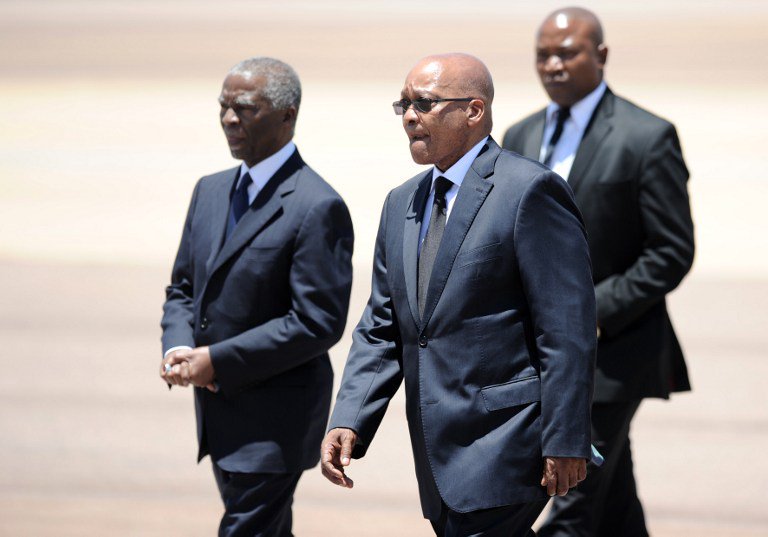The South African government on July 14 confirmed it was deploying 25,000 troops in its two provinces, KwaZulu Natal and Gauteng, after police failed to quell violence and looting following the incarceration of former president Jacob Zuma on July 7.
KwaZulu-Natal is Zuma’s province of origin, home of the Zulu people, South Africa’s largest ethnic group. Protests had erupted after the ex-leader handed himself over to police to serve a 15-month jail term for contempt of court.
Zuma, 79, defied a constitutional court order to give evidence at an inquiry investigating high-level corruption during his nine years in office until 2018.
When South Africa’s President Cyril Ramaphosa addressed the nation on July 11 on new COVID-19 regulations, he condemned the protests as “acts of violence based on ethnic mobilization.”
Zulu nation prime minister prince Mangosuthu Buthelezi slammed President Ramaphosa for his “defamatory remarks about Zulu people.”
“I don’t understand what is meant by ethnic mobilization. It’s not about Zulu people against other people, even in the case where they mobilized support for our former president Zuma. Mr. Ace Magashule is not a Zulu and the leaders of Mpumalanga who came here to support Zuma were not necessarily Zulu. This has nothing to do with Zulus, so I don’t know what is meant by ethnic mobilization in what is happening now,” Buthelezi said.
By July 12, South Africa’s currency (the rand) tumbled against major currencies as the riots sprung up, disrupting public transport services and forcing businesses to close. The currency dropped by as much as 2% against the United States dollar. More than 200 shopping malls had been looted by mid-Monday afternoon and the economy lost an estimated US$3.4 billion dollars, according to the Gauteng Premier. Over 150,000 jobs have been placed at risk by the protests.
On July 16 over 2,100 arrests had been made and the death toll stood at 337 with many people trampled to death during looting at stores, while the police and the military fired stun grenades and rubber bullets to try to halt the unrest.
Black Poverty Is Not An Accident
The protests in South Africa are most likely a result of the deep-seated grievances that have not been resolved since the end of apartheid in 1994 like poverty and inequality. While the incarceration of Jacob Zuma has been cited as the turning point to the protests, the lack of ownership of the means of production among blacks is also an attribute to the chaos.
At the time of the end of apartheid in 1994, more than 80% of the land was in the hands of the white minority. According to the Institute of Poverty, Land and Agrarian Studies, suggestions are that just under 60,000 white-owned farms accounted for about 70% of the total area of the country in the early 1990s. The country’s land reform program has been slow with some indications that less than 10 percent of the total land has been redistributed from white to black ownership since 1994.
When former president Zuma left office in 2018, unemployment was at 27 percent and he emphasized that his party’s incoming government embark on what he termed “radical economic transformation” to address the economic imbalances created during apartheid. Under President Ramaphosa, the overall unemployment rate has risen to 33 percent, with 46 percent of those unemployed being below the age of 35.
As a result, white people continue to be more skilled than their black counterparts and also they attain higher education levels. Therefore, they are likely to attain higher positions in the job market, and on average, earning higher wages. The crisis in South Africa can therefore be understood as the white population’s extensive control over the country’s economy.
South Africa-based political analyst Rutendo Matinyarare said the anger shown by the protestors is symptomatic of the failure of the political economy in addressing the needs of the black majority.
“The violence goes beyond the Jacob Zuma arrest. The Zuma case was just a spark for the anger of people that includes lack of transformation from apartheid, the maintenance of an apartheid economy that is exclusionary in that it excludes black people from participation. The fact that black people have been left in the very exact position they were during apartheid where they had no factors of production, no land to put their own houses, no land to produce food, and the only way they had to survive was to work for capital,” said Matinyarare.
On July 16 President Ramaphosa visited KwaZulu-Natal province where almost 155 people were killed during the protests and acknowledged that the violence was “planned”.
Matinyarare also indicated that South Africa’s three-year recession and the lockdown imposed accentuated the looting and at the moment is difficult to come up with the total cost of damage incurred during the chaos.
“It is difficult to come up with a total cost of the losses incurred but the cost of violence is that there are deaths that have been reported. It has cost the nations unity. There are now divisions along racial lines. This is now set to create a big rift between the ‘haves’ and the ‘have-nots’ who are the whites and blacks, respectively. A few blacks have been co-opted into the system, but when you look at it their wealth is not a result of legacy but debt because black people never had the opportunity to create wealth. It is just a bandage being put on a rotten wound,” added Matinyarare.
The South African government needs to do more to address widening inequality, rampant unemployment and deliver on the promises of development for all and not just a few. It needs to prove its detractors wrong – that its pursuit of what it terms “radical economic transformation” fulfills the promise of addressing the country’s skewed economic ownership patterns.
















